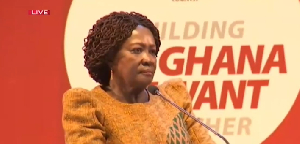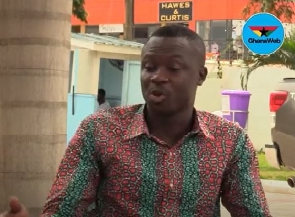Opinions of Wednesday, 25 June 2008
Columnist: Okoampa-Ahoofe, Kwame
The Illegitimate Presidency of Rawlings Justifies .. Part II
The Illegitimate Presidency of Rawlings Justifies the Parliamentary Election of Dr. Amoako – Part 2
By Kwame Okoampa-Ahoofe, Jr., Ph.D.
The inherent Dual-Citizenship nature of the 1992 Fourth-Republican Constitution of Ghana stems from the fact that, for the first time in 35 years, it became extremely easy for anybody possessing Ghanaian citizenship to qualify to run for the presidency. Of course, his putsch of June 4, 1979 ensured that Flt.-Lt. Jeremiah John Rawlings would breach the norm; and so in a sense, June 4th was a political “revolution” of sorts. The quite widespread societal discontent, stemming from military usurpation and gross administrative incompetence, partially mitigated the unorthodox fact of the leader of that putsch being readily tolerated by the general Ghanaian populace.
Still, Flt.-Lt. Rawlings was a political anomaly. To begin with, the man did not speak English or any of our indigenous languages with a recognizable Ghanaian or African accent, which prompted many Ghanaians, largely rural dwellers and the lowly educated, to dub him: “That son of the white man.” Many Ghanaians also bitterly complained about having a hard time comprehending the accent of this newly appointed military ruler the substance of whose speech nobody really seemed to understand, except for the handful of uniformed men in whose company he regularly appeared. But, of course, the general atmosphere of acute discontent rendered less relevant the question of whether the bulk of the Ghanaian populace understood what would later be described as Mr. Rawlings’ faux-Scottish accent or not. The fact that he had promised to return the country to civic and democratic governance rendered him rather endearing. One Roman Catholic priest, who would later become a member of Mr. Rawlings’ so-called Provisional National Defense Council (PNDC), had even dubbed the latter Ghana’s “Junior Jesus.” Rev. Damuah would shortly have a falling out with, first, his own Church, and later with “Junior Jesus.”
That the 1992 Republican Constitution of Ghana made it easy for anybody with Ghanaian citizenship to vie for the presidency, stemmed from the fact that unlike the previous three Constitutions (1957, 1969 and 1979), to become President merely required that only one of the parents of the prospective Candidate for President ought to have been born and raised in Ghana. In reality, however, as subsequent events were to pan out, Ghana’s Fourth-Republican Constitution was a veritably rehabilitative largesse for Mr. Rawlings. All the three previous Constitutions had clearly stipulated that not only did both of the Presidential Candidate’s parents ought to have been born in present-day Ghana, the prospective Presidential Candidate’s grandparents also ought to have been born in Ghana. Needless to say, one did not have to look hard in order to figure out exactly why the 1992 Republican Constitution had dramatically departed from our three previous Constitutions on the critical question of citizenship and parentage. It, however, seemed to make quite a lot of sense that such dramatic change would be introduced. Like most other Third-World nations, Ghana was increasingly becoming globalized, largely the direct result of economic privation bred of perennial administrative incompetence. The latter had, of course, resulted in the massive migration of Ghanaians into countries with better functioning economies. Often it was the best and the brightest, the so-called crème de la crème, that massively migrated, thus culminating in what has widely become known as the “Brain-Drain.”
It is among the latter category of migrants to which Dr. Samuel Kwadwo Amoako belongs. A traditionally trained Ghanaian teacher, Dr. Amoako would seek the proverbial “Greener Pastures” in the United States of America, where he would migrate in the early 1980s, managing to secure decent graduate degrees from Howard University, Washington, D.C., and New York City’s Columbia University Teachers’ College, where he would earn his Doctor of Education degree (Ed.D.) Prior to the preceding, Professor Amoako had earned the Bachelor of Science (B.Sc.) degree from Ghana’s flagship academy, the University of Ghana, in Economics. What makes Dr. Samuel Kwadwo Amoako’s decision to return to Ghana and actively participate in mainstream Ghanaian politics worthy of both our admiration and emulation, stems primarily from the fact that it also comes at precisely the very moment when there rages a heated national and, in fact, global debate over the imperative necessity for many a well-educated Third-World immigrant to return to his, or her, country of origin in order to help kick-start the critical stage of the industrial and cultural development of many a woefully underdeveloped country, or economy, if whole nations and cultures are not to be totally engulfed in irreversible socioeconomic and cultural regression in the eerily foreseeable future. It is therefore paradoxically hypocritical, on the part of our relatives at home, for the likes of Dr. Amoako to be cynically threatened with abject political proscription in the affairs of the very country in which they were born and have spent approximately half of their adult professional lives in helping to rebuild and develop.
Indeed, looking at the painfully raw deal with which Dr. Amoako appears to be direly confronting at the time of this writing (6/19/08), it seems that the Ghanaian relatives, friends and associates of many a Ghanaian resident abroad would rather envisage us as mere money bags or New Colonial Territories whose sole raison d’être is to serve our kinsmen and women at home in much the same manner that Colonial Ghana, the erstwhile Gold Coast, faithfully and obsequiously served as an economic appendage for good, old Britannia. In other words, to those relatives and compatriots at home, Ghanaians Abroad, particularly those of us resident here in the United States and Canada, are mere quarry to be inexorably and voraciously mined for as much wealth as only the mind could fathom. And, needless to say, the preceding state of affairs is rather tragic, because whether they maintain Dual-Citizenship or not, most Ghanaians resident abroad have never ceased regarding their old homeland and home-districts as our only one and true moorings with which we are eternally linked and primarily identified, both by ourselves as well as by our newly-found American relatives, friends and associates.
To be certain, as first-generation Americans, we continue to be routinely identified as “Africans,” “Outsiders,” “Foreigners,” not as “African-Americans,” irrespective of whether we have held our American Citizenship for twenty or forty years! For instance, this writer has had to often remind his largely white and teenage, American-born students that while he may not “sound” and even “behave” (or carry himself) exactly like the stereotypical American, nevertheless, he is more patriotically American than almost every one of his students, simply because unlike the latter, Professor Kwame Okoampa-Ahoofe, Jr., voluntarily chose both his residency as well as his citizenship as an American. Of course, this is not exactly the historical reality; but does it matter, really?
Indeed, legend even has it that the renowned conservative Irish-American political commentator, Mr. Patrick J. Buchanan, once advocated massively restricting the immigration of us so-called Black Africans into the United States. And Mr. Buchanan’s rationale? Simply that the racially mixed offspring of conjugal unions between continental Africans and white Americans are historically and politically classified as “Black” and, besides, Africans, unlike Asians and Latin-Americans, for example, did not readily mix with “mainstream” Americans. In essence, by Mr. Buchanan’s logic, the more Africans are allowed to immigrate into the United States, the faster the purported purity and political dominance of white Americans stand to be eroded. In sum, my argument here is that the mere acquisition of American Citizenship by any Ghanaian-born, or African, person does not automatically guarantee the political and cultural alienation of the “Naturalized” Ghanaian, or African, from the affairs and destiny of his/her country of birth, in particular, and destiny and affairs of the African continent, in general, as the bulk of our relatives, friends and associates back home appear to believe.
*Kwame Okoampa-Ahoofe, Jr., Ph.D., is Associate Professor of English, Journalism and Creative Writing at Nassau Community College of the State University of New York, Garden City. He is the author of 17 books, including “Romantic Explorations” and “Ghanaian Politics Today” (Atumpan Publications/lulu.com, 2008). E-mail: okoampaahoofe@aol.com.












